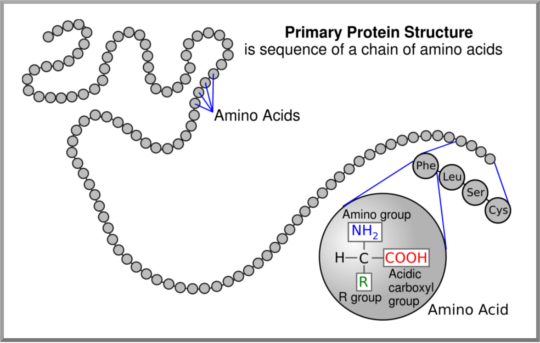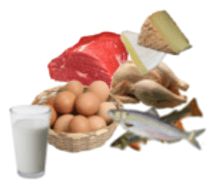What Is Protein?
Protein, the building blocks of life, the essential ingredient for every form of life, for growth, pregnancy, formation of blood, bone, and every vital tissue. It is essential for the healing of wounds, the warding off of infection, the maintenance of body weight, and the conduct of vital organs and glands in the body.

Protein: Why Do I Need it?
Because your body can’t store amino acids, which are the basic material for all types of protein, it needs a daily supply to form new protein. It is protein that made you what you are and you need thousands of different proteins, in excess of ten thousand, just to keep you that way. That is one of the reasons I published Diet – Protein.
How Do I Know Which Foods Contain Protein?
Meat is the greatest source for human consumption. Animal sources are Meat; Fish; Poultry; Milk; Eggs; and Cheese. These foods contain high sources, as well as carbohydrates and fats, which, as your are probably now aware, are essential in maintaining good health.
Animal sources are Meat; Fish; Poultry; Milk; Eggs; and Cheese. These foods contain high sources, as well as carbohydrates and fats, which, as your are probably now aware, are essential in maintaining good health.
With regards to meat, poultry and fish are recommended, although red meat can be eaten, Diet – Protein recommends only in moderation and make sure it is lean and trim off any excess fat.
There are many green vegetable sources, some of the top ones  are Spinach; Broccoli; Brussels Sprouts; Asparagus; and Collard Greens. Not only are these vegetables a good source of protein, they are also rich in antioxidants, fiber, minerals and vitamins.
are Spinach; Broccoli; Brussels Sprouts; Asparagus; and Collard Greens. Not only are these vegetables a good source of protein, they are also rich in antioxidants, fiber, minerals and vitamins.
Superfoods: Fiber
Also good sources are Wheat; Corn; Rye; Yeast; Beans; Peas; Lentils; Soya Beans; Nuts; although these also contain elements of carbohydrate and fat.
How Can I Calculate My Daily Protein Requirements?
The following figures are based on the Reference Nutrient Intake (RNI). The RNI is the amount of nutrient that is enough for at least ninety-seven percent of the population. Research has shown that we do not need as much protein as previously thought, gradually, over the last twenty years, the recommended amounts for adults and children has been reduced by more than fifty percent.
The recommended daily intake for men between the ages of fifteen and forty-nine is between 55.2 and 55.5 grams. For men fifty plus this reduces to a daily intake of 53.3 grams.
Each gram of protein supplies four calories of energy so for men between fifteen and forty-nine this amounts to approximately two hundred and twenty calories when calculating your calorie intake. For men fifty plus it’s slightly less at two hundred and twelve calories.
For women between the ages of fifteen and forty-nine the daily recommended intake is between 45 and 45.4 grams which is around one hundred and eighty calories when calculating your daily calorie intake.
In contrast to men fifty plus whose daily intake reduces by 2.3 grams daily, women fifty plus increase their daily intake by 1.5 grams which increases their daily calorie intake to around one hundred and eighty five. (These figures are for adult protein requirements and differ for children’s requirements).
Do I Need To Adhere To
The RNI Recommended Daily Amounts of protein?
No, these are the recommended amounts, it depends on the individual as to the amount needed daily. The average person who does very little or no exercise won’t need the same amount as someone who exercises regularly, and will vary with the type of exercise undertaken.
On average, about fifteen percent of your calorie intake should come from protein, although for a healthy adult, providing it replaces refined carbohydrates, which includes white bread, sugary beverages and white rice, increasing your intake by twenty to twenty-five percent may possibly reduce the risk of heart disease.
Although increasing your daily intake may be beneficial in some cases, you need to be aware that too higher intake can possibly lead to osteoporosis and kidney malfunctioning.
For people suffering from diabetes or failing kidney functioning, it is advisable to stick to the minimum intake, as this may improve kidney functioning, but as always, Diet – Protein recommends it is always wise to consult your doctor who can tell you what your protein intake should be regardless of your condition.
As to the number of calories in your daily intake, remember that one gram of protein contains four calories, so, whatever your recommended daily intake may be, multiplying that by four will give you the amount of calories when calculating your daily calorie intake.
For example, if your daily intake is one hundred grams, multiplying that by four will give you four hundred calories to be taken into consideration when calculating your daily calorie intake.
